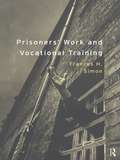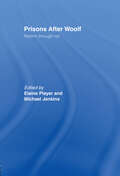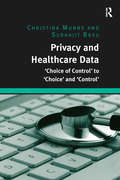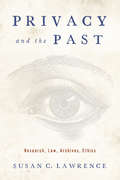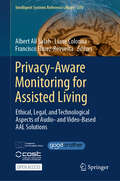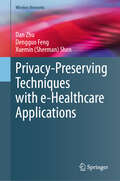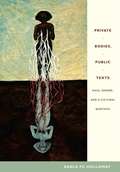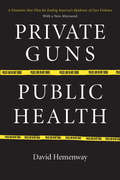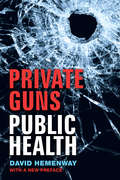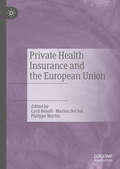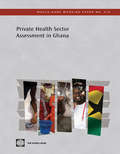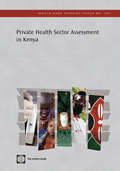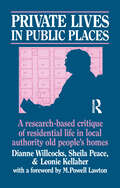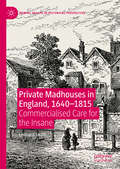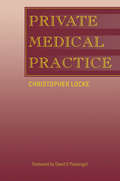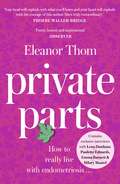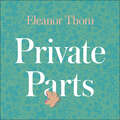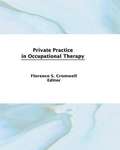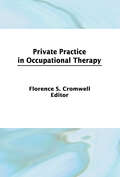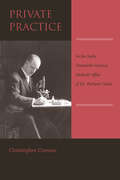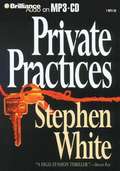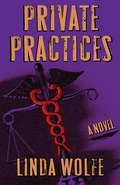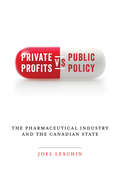- Table View
- List View
Prisoners' Work and Vocational Training
by Frances H. SimonMost prisoners in the UK are required to work. Yet prison work is a relatively neglected subject in the existing literature on imprisonment and few studies have focused on the nature of prison work, prisoners' experience of it, and the extent to which it meets the need of rehabilitating prisoners. Prisoners' Work and Vocational Training sheds new light on this crucial area in the work of prisons and examines: *the nature of training received by prisoners *the actual work they undertake *how this relates to the world or work outside *the role it plays in helping to secure employment on release. Frances Simon employs a balance of qualitative and quantitative data, including first hand accounts from UK prisons, gathered during field research. Her book will be essential reading for all those studying criminology and prison studies and all professionals working with prisoners, including probation officers and social workers.
Prisons After Woolf: Reform through Riot
by Michael Jenkins Elaine PlayerFor the past few years prisons have attracted much media attention, due to substantial increases in the prison population and the deteriorating conditions in which prisoners are held. In addition, there has been industrial action by prison officers and a series of disturbances and riots by prisoners. Following the riot at Strangeways prison in Manchester in 1990 Lord Justice Woolf was called to conduct an inquiry into the riots and their causes. Prisons After Woolf serves as a basic source of information on prison issues and reviews them in the light of the Woolf proposals. In so doing, its contributors, drawn from all areas of the legal and prison system, present an important broad perspective on the major questions in penology today.
Privacy Issues in Biomedical and Clinical Research
by Board On BiologyA report on Privacy Issues in Biomedical and Clinical Research
Privacy and Healthcare Data: 'Choice of Control' to 'Choice' and 'Control'
by Subhajit Basu Christina MunnsIn order for the information society to realise its full potential, personal data has to be disclosed, used and often shared. This book explores the disclosure and sharing of data within the area of healthcare. Including an overview of how health information is currently managed, the authors argue that with changes in modern society, the idea of personal relationships with a local GP who solely holds and controls your health records is becoming rapidly outdated. The authors aim to encourage and empower patients to make informed choices about sharing their health data. They do this by developing a three-stage theoretical model for change to the roles of the NHS and the individual. The study generates debate to stimulate and inspire new models and policy, and to provoke new visions for the sharing of healthcare data. Such discussion is framed through an exploration of the changing concept of 'privacy' and 'patient control' in healthcare information management. The volume draws on best practices from Europe and the USA and combines these to form a suggested vision for the UK as an early adopter of change. The volume will be essential reading for academics in the field of privacy and data protection, as well as healthcare and informatics professionals across different jurisdictions.
Privacy and the Past: Research, Law, Archives, Ethics
by Susan C. LawrenceWhen the new HIPAA privacy rules regarding the release of health information took effect, medical historians suddenly faced a raft of new ethical and legal challenges--even in cases where their subjects had died years, or even a century, earlier. In Privacy and the Past, medical historian Susan C. Lawrence explores the impact of these new privacy rules, offering insight into what historians should do when they research, write about, and name real people in their work. Lawrence offers a wide-ranging and informative discussion of the many issues involved. She highlights the key points in research ethics that can affect historians, including their ethical obligations to their research subjects, both living and dead, and she reviews the range of federal laws that protect various kinds of information. The book discusses how the courts have dealt with privacy in contexts relevant to historians, including a case in which a historian was actually sued for a privacy violation. Lawrence also questions who gets to decide what is revealed and what is kept hidden in decades-old records, and she examines the privacy issues that archivists consider when acquiring records and allowing researchers to use them. She looks at how demands to maintain individual privacy both protect and erase the identities of people whose stories make up the historical record, discussing decisions that historians have made to conceal identities that they believed needed to be protected. Finally, she encourages historians to vigorously resist any expansion of regulatory language that extends privacy protections to the dead. Engagingly written and powerfully argued, Privacy and the Past is an important first step in preventing privacy regulations from affecting the historical record and the ways that historians write history.
Privacy-Aware Monitoring for Assisted Living: Ethical, Legal, and Technological Aspects of Audio- and Video-Based AAL Solutions (Intelligent Systems Reference Library #270)
by Albert Ali Salah Liane Colonna Francisco Florez-RevueltaThis open access book provides an interdisciplinary collection of perspectives on the design of privacy-aware audio and video-based monitoring solutions for Active and Assisted Living (AAL). AAL involves leveraging innovative technologies to create supportive and inclusive environments, empowering older, impaired, or frail individuals to live independently and actively participate in society. Bridging technology, law, and ethics, this book explores state-of-the-art approaches for the development of AAL that prioritize user privacy, making it an essential resource for researchers, practitioners, and policymakers in the field. It is the culmination of GoodBrother, a Europe-wide project funded by the COST Association, aimed at enhancing awareness and expertise on the ethical, legal, and privacy issues associated with audio- and video-based monitoring in assisted living contexts. Written by experts from computing, engineering, healthcare, design, law, ethics, and sociology, it provides diverse perspectives into AAL. • Introduces a taxonomy of AAL technologies and applications, providing guidance from data acquisition and processing to interaction and infrastructure of AAL systems. • Describes the core competencies, including machine learning, privacy preservation in audio and video, data security, and security by design. • Presents in-depth reviews and case studies on AAL applications, such as fall detection, gait and frailty recognition, activities of daily living, vital sign monitoring, affective computing, and smart mirrors. • Contains the state of the art and advances in AAL, especially with regards to privacy, ethical, and legal issues, including GDPR, but also the implications of the AI Act and the Cybersecurity Act.
Privacy-Preserving Techniques with e-Healthcare Applications (Wireless Networks)
by Dengguo Feng Dan Zhu Xuemin (Sherman) ShenThis book investigates novel accurate and efficient privacy-preserving techniques and their applications in e-Healthcare services. The authors first provide an overview and a general architecture of e-Healthcare and delve into discussions on various applications within the e-Healthcare domain. Simultaneously, they analyze the privacy challenges in e-Healthcare services. Then, in Chapter 2, the authors give a comprehensive review of privacy-preserving and machine learning techniques applied in their proposed solutions. Specifically, Chapter 3 presents an efficient and privacy-preserving similar patient query scheme over high-dimensional and non-aligned genomic data; Chapter 4 and Chapter 5 respectively propose an accurate and privacy-preserving similar image retrieval scheme and medical pre-diagnosis scheme over dimension-related medical images and single-label medical records; Chapter 6 presents an efficient and privacy-preserving multi-disease simultaneous diagnosis scheme over medical records with multiple labels. Finally, the authors conclude the monograph and discuss future research directions of privacy-preserving e-Healthcare services in Chapter 7.
Private Bodies, Public Texts: Race, Gender, and a Cultural Bioethics
by Karla Fc HollowayIn Private Bodies, Public Texts, Karla FC Holloway examines instances where medical issues and information that would usually be seen as intimate, private matters are forced into the public sphere. As she demonstrates, the resulting social dramas often play out on the bodies of women and African Americans. Holloway discusses the spectacle of the Terri Schiavo right-to-die case and the injustice of medical researchers' use of Henrietta Lacks's cell line without her or her family's knowledge or permission. She offers a provocative reading of the Tuskegee syphilis study and a haunting account of the ethical dilemmas that confronted physicians, patients, and families when a hospital became a space for dying rather than healing during Hurricane Katrina; even at that dire moment, race mattered. Private Bodies, Public Texts is a compelling call for a cultural bioethics that attends to the historical and social factors that render some populations more vulnerable than others in medical and legal contexts. Holloway proposes literature as a conceptual anchor for discussions of race, gender, bioethics, and the right to privacy. Literary narratives can accommodate thick description, multiple subjectivities, contradiction, and complexity.
Private Guns, Public Health
by David HemenwayOn an average day in the United States, guns are used to kill almost eighty people, and to wound nearly three hundred more. If any other consumer product had this sort of disastrous effect, the public outcry would be deafening; yet when it comes to guns such facts are accepted as a natural consequence of supposedly high American rates of violence. Private Guns, Public Health explodes that myth and many more, revealing the advantages of treating gun violence as a consumer safety and public health problem. David Hemenway fair-mindedly and authoritatively demonstrates how a public-health approach-which emphasizes prevention over punishment, and which has been so successful in reducing the rates of injury and death from infectious disease, car accidents, and tobacco consumption-can be applied to gun violence. Hemenway uncovers the complex connections between guns and self-defense, gun violence and schools, gun prevalence and homicide, and more. Finally, he outlines a policy course that would significantly reduce gun-related injury and death.
Private Guns, Public Health, New Ed.
by David HemenwayOn an average day in the United States, guns are used to kill over ninety people and wound about three hundred more; yet such facts are accepted as a natural consequence of supposedly high American rates of violence. Private Guns, Public Health reveals the advantages of treating gun violence as a consumer safety and public health problem—an approach that emphasizes prevention over punishment and that has successfully reduced the rates of injury and death from infectious disease, car accidents, and tobacco consumption. Hemenway fair-mindedly and authoritatively outlines a policy course that would significantly reduce gun-related injury and death, pointing us toward a solution.
Private Health Insurance and the European Union: Eu Legislation At The National Level
by Philippe Martin Cyril Benoît Marion Del SolResearch has paid little attention to date on how European Union law and regulation affect both the public-private mix in healthcare and the organization of private health insurance as an industry. Filling this gap, this collective book provides insights on the political economy of EU insurance regulation, its impact on private health insurers and on its interactions with domestic healthcare policy-making in four countries. Assembling original contributions drafted by a multidisciplinary team, Private Health Insurance and the European Union offers a thorough examination of a largely unrecognized source of EU influence in healthcare – and sheds a new light on the role played by private actors in social policy. Chapter 1 is available open access under a Creative Commons Attribution 4.0 International License via link.springer.com.
Private Health Sector Assessment in Ghana
by Marty Makinen Stephanie Sealy Ricardo A. Bitrán Sam Adjei Rodrigo MuñozPrivate Health Sector Assessment in Ghana is part of the World Bank Working Paper series. These papers are published to communicate the results of the Bank's ongoing research and to stimulate public discussion. The private health sector in Ghana is a large and important sector in the market for health-related goods and services. However, little has been documented concerning the size and configuration of private providers and their contribution to health sector outcomes. With better information about the size, scope, distribution, and constraints of private actors, Ghana's public policy makers could engage more effectively with the private sector. The scope of the Ghana study involved assessing the role of its private sector in the overall health system; considering the potential of the private sector to play a greater role; and identifying ways to improve the public-private interface to increase equity, access, and efficiency in the health system.
Private Health Sector Assessment in Kenya
by Nelson Gitonga Frank Feeley III Jeff Barnes Caytie Decker Barbara O'HanlonThis paper broadly examines the health sector in Kenya, by synthesizing an assessment of the health sector with an analysis of the market. After considering the legal and regulatory framework, the policy enforcement, the human resource capacity, and the financing of health systems, the paper makes recommendations for policy makers.
Private Lives in Public Places: Research-based Critique of Residential Life in Local Authority Old People's Homes
by Sheila Peace Leonie Kellaher Dianne WillcocksPublic Order and Private Lives is a radical examination of the political forces which shape the law and order debate in Britain. Mike Brake and Chris Hale provide a hard-hitting analysis of Conservative policies on Crime, showing that, ironically, Conservative policies have created the very social conditions in which crime has flourished. They argue that the government is undermining basic civil liberties by its increased use of legislation as a means of control and coercion.
Private Madhouses in England, 1640–1815: Commercialised Care for the Insane (Mental Health in Historical Perspective)
by Leonard SmithThis book examines the origins and early development of private mental health-care in England, showing that the current spectacle of commercially-based participation in key elements of service provision is no new phenomenon. In 1815, about seventy per cent of people institutionalised because of insanity were being kept in private ‘madhouses’. The opening four chapters detail the emergence of these madhouses and demonstrate their increasing presence in London and across the country during the long eighteenth century. Subsequent chapters deal with specific aspects in greater depth - the insane patients themselves, their characteristics, and the circumstances surrounding admissions; the madhouse proprietors, their business activities, personal attributes and professional qualifications or lack of them; changing treatment practices and the principles that informed them. Finally, the book explores conditions within the madhouses, which ranged from the relatively enlightened to the seriously defective, and reveals the experiences, concerns and protests of their many critics.
Private Medical Practice
by Christopher LockeIf you are reading this, it is likely that you have accepted, or may be considering responsibility for a relative or friend who has cancer. This can be a daunting situation, and this guide provides information and advice to help you deal with the most common problems faced by carers of cancer patients. It provides answers to many of the questions you may wish to ask. The author, Dr Welsey Finegan, was a consultant in palliative medicine before being diagnosed with cancer himself. This gave him a unique perspective that enabled him to write the popular "Trust Me I'm a Doctor Cancer Patient", which is packed with practical and accessible advice for patients. More recently Dr Finegan has also become a family carer, and is determined to use his expertise to provide other carers with a concise source of specialist knowledge.This guide deals with pain, physical symptoms, psychological problems, death and bereavement, and it adopts a unique approach to encourage the carer to work with the patient, doctors and nurses to achieve realistic and mutually agreed outcomes. You are encouraged to learn about day-to-day problems, ask relevant questions and take an active part in sharing the care of the patient. The book will lead you towards relevant sources of help and advice, and suggests tried and tested ideas that have helped other patients.
Private Parts: Living well with bad periods and endometriosis
by Eleanor ThomEleanor Thom is living with endometriosis and she thinks that it's time to talk a bit more about our private parts.Part memoir, part guide book and part survival guide, Private Parts retraces Eleanor's journey with endometriosis, offering readers practical, down-to-earth and friendly advice covering everything from what actually happens in an internal exam to the perfect post-op wardrobe. Eleanor writes as fearlessly as she has fought this disease; with heart, honesty and a humour that is rarely afforded to subjects as serious as this. - Phoebe Waller-BridgePrivate Parts is just like its author: funny, brave, charming, honest, reassuring and ultimately brilliant - Joe LycettWritten for the newly diagnosed as well as those who have had more operations than they can count on one hand, Private Parts is a friend and companion to everyone whose life has been impacted by this little understood condition. It will arm you for your doctors appointments and bring light and laughter in darker times. Features exclusive inspirational interviews with Hilary Mantel, Paulette Edwards, Lena Dunham and Emma Barnett, as well as insights from experts in the field.*A Stylist and Dazed best of 2019 book***As featured in How Do You Cope with Elis + John on BBC Radio 5, available to listen to on BBC Sounds**
Private Parts: Living well with bad periods and endometriosis
by Eleanor ThomEleanor Thom is living with endometriosis and she thinks that it's time to talk a bit more about our private parts.Part memoir, part guide book and part survival guide, Private Parts retraces Eleanor's journey with endometriosis, offering readers practical, down-to-earth and friendly advice covering everything from what actually happens in an internal exam to the perfect post-op wardrobe. Eleanor writes as fearlessly as she has fought this disease; with heart, honesty and a humour that is rarely afforded to subjects as serious as this. - Phoebe Waller-BridgePrivate Parts is just like its author: funny, brave, charming, honest, reassuring and ultimately brilliant - Joe LycettWritten for the newly diagnosed as well as those who have had more operations than they can count on one hand, Private Parts is a friend and companion to everyone whose life has been impacted by this little understood condition. It will arm you for your doctors appointments and bring light and laughter in darker times. Features exclusive inspirational interviews with Hilary Mantel, Paulette Edwards, Lena Dunham and Emma Barnett, as well as insights from experts in the field.*A Stylist and Dazed best of 2019 book***As featured in How Do You Cope with Elis + John on BBC Radio 5, available to listen to on BBC Sounds**
Private Parts: Living well with bad periods and endometriosis
by Eleanor ThomHow to live happily and well with endometriosis, from someone who has tried everything and lived to tell (and laugh at) the tale.What the internet can tell you about endometriosis: Endometriosis is a chronic and incurable condition that affects 1 in 10 women with approximately 1.6 million sufferers in the UK alone, but only 20% of the general public have heard of it. It takes an average of seven and a half years to get a diagnosis in the UK and affects sufferers' capacity to work, their fertility and their ability to enjoy sex. What Eleanor Thom can tell you about endometriosis: You are so much more than the sum of your private parts. Part memoir, part guide book and part survival guide, Private Parts retraces Eleanor's own journey with endometriosis, offering readers practical, down-to-earth and friendly advice covering everything from what actually happens in an internal exam, to finding the right specialist for you, the perfect post-op wardrobe and to why you should look to Frida Kahlo for inspiration in your darkest moments. Written for those looking to live well with their endometriosis and for those who are looking for help to understand the disease and how it affects those with it, Private Parts is a call to action for people to speak up about an illness which is still so misunderstood.(P)2019 Hodder & Stoughton Limited
Private Practice in Occupational Therapy
by Florence CromwellValuable insights into the potentials, risks, and excitement of establishing a private practice in occupational therapy. This groundbreaking volume provides general and specific ideas to help guide the OT professional who is considering independent practice.
Private Practice in Occupational Therapy
by Florence S CromwellValuable insights into the potentials, risks, and excitement of establishing a private practice in occupational therapy. This groundbreaking volume provides general and specific ideas to help guide the OT professional who is considering independent practice.
Private Practice: In the Early Twentieth-Century Medical Office of Dr. Richard Cabot
by Christopher CrennerThe beginning of the twentieth century marked the rise of advanced medical technologies, allowing doctors to diagnose and treat diseases in new ways. Although American physicians accepted the validity of the new science of medicine, they were sometimes reluctant to trust technology over their professional judgment or intuition. Likewise, patients raised their own suspicions about the new scientific tools, sometimes resisting or contradicting the advice of their physicians.Here Christopher Crenner examines a critical period in medical history, focusing on the office practice of Boston physician Richard Cabot. Intimate epistolary exchanges between Cabot and his patients shed light on the challenges presented by the new technologies—especially their impact on the personal relationships between doctor and patient—providing insight into a time of expanding science and radical change.
Private Practices (Alan Gregory Series #2)
by Stephen WhiteDr. Alan Gregory is a practicing psychologist with a few little problems to work through. He has an office filled with bloody corpses. He has a teenage patient who may be a sad victim or a savage killer. He has a beautiful estranged wife who wants him back in the worst way, and a lovely lover doing her best to keep him. He has a cop who wants him off the case, and an unknown enemy who wants him permanently out of action. To round out his many dilemmas, the list of suspects reads like a Who's Who of his posh Colorado community. And as a Rocky Mountain winter wonderland is swept by a nightmare blizzard of evil, secret sins leave a trail of blood leading to their hiding place deep in the heart and mind of a monstrous murderer...
Private Practices: A Novel
by Linda WolfeA medical shocker Twin gynecologists are found dead in their trash-littered Upper East Side Manhattan apartment. Who killed them? And why? Based on a true story that Linda Wolfe was the first journalist to write about, her novel explores the mystery behind the deaths of these wealthy and prominent doctors, and the dark and perverse secret that ruled their lives--one that they tried desperately to hide until the final moments of their deaths.
Private Profits versus Public Policy: The Pharmaceutical Industry and the Canadian State
by Joel LexchinThe widespread condemnation of drastic price increases on life-saving drugs highlights our growing dependency on and vulnerability to international pharmaceutical conglomerates. However, aren't the interests of the public supposed to supersede the pursuit of private profit?In his new work, Private Profits versus Public Policy, Joel Lexchin addresses this question as he examines how public policy with respect to the pharmaceutical industry has evolved in Canada over the past half century. Although the Canadian government is supposed to regulate the industry to serve the needs of public health, waves of deregulatory reforms and intellectual property rights legislation have shifted the balance of power in favour of these companies' quest for profit. Joel Lexchin offers a series of recommendations to tip the scale back in the public's favour. This enlightening work is the first book that deals exclusively with the pharmaceutical industry in Canada in over thirty years.
